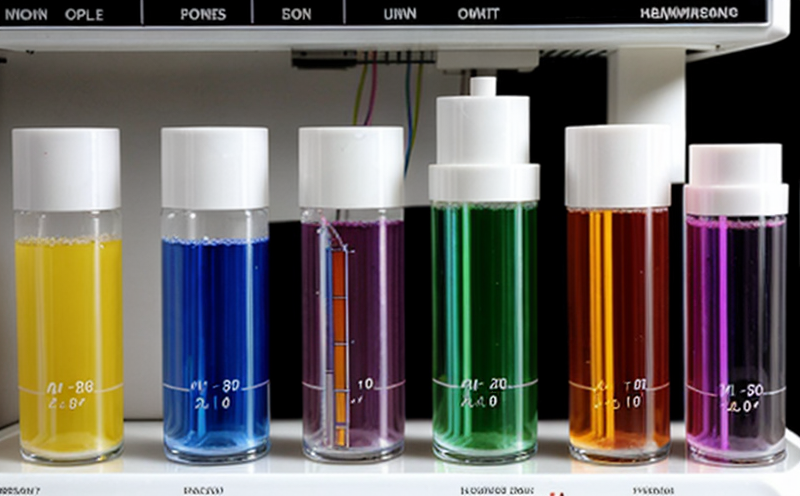JIS K0050 Chromatographic Testing of Organic Compounds
The JIS K0050 standard is a critical component in ensuring compliance with Japanese industrial and chemical standards. This method specifically addresses the chromatographic analysis of organic compounds, which are fundamental to numerous industries including pharmaceuticals, petrochemicals, and environmental science.
Chromatography plays a pivotal role in separating complex mixtures into individual components for identification and quantification. The JIS K0050 standard outlines procedures that ensure precision and reliability in detecting trace amounts of organic compounds within samples. This is particularly important as small concentrations can have significant effects on the performance and safety of products.
The technique involves passing a mixture through a stationary phase, which interacts selectively with the different components of the sample, leading to their separation based on physical or chemical properties such as polarity, size, and adsorption characteristics. The JIS K0050 method specifies the use of various types of columns (e.g., silica gel, alumina) depending on the nature of the compounds being analyzed.
The process begins with thorough sample preparation to ensure that all organic compounds are in a form suitable for analysis. This can involve extraction methods like Soxhlet extraction or solvent evaporation techniques. The prepared samples are then injected into the chromatographic instrument, where they travel through the stationary phase under controlled conditions of temperature and pressure.
Understanding the nuances of this standard is essential for compliance officers tasked with ensuring that products meet regulatory requirements. It also supports R&D engineers in optimizing formulations and quality managers in maintaining consistent product quality. The precision achieved by JIS K0050 ensures that even minute quantities of compounds are detectable, which is crucial for industries where contamination or impurities could lead to significant issues.
The instrumentation used in this process includes gas chromatographs (GC) and liquid chromatographs (LC), depending on the nature of the organic compounds. GCs are typically used for volatile compounds, while LCs handle non-volatile ones more effectively. The choice of detector is also crucial; common detectors include flame ionization detectors (FID) for GC and UV/Vis detectors for LC.
One of the key aspects of JIS K0050 is the rigorous calibration process that ensures accurate detection limits. Calibration standards are carefully selected to cover the expected range of compounds, ensuring that any compound within this range can be accurately quantified. This is especially important in industries where trace amounts of contaminants could have substantial impacts.
The standard also emphasizes the importance of maintaining consistent operating conditions across multiple analyses. Variations in temperature, pressure, or flow rate can significantly affect the separation and detection of compounds. Thus, strict adherence to these parameters is mandatory for reliable results.
To summarize, JIS K0050 chromatographic testing provides a robust framework for analyzing organic compounds in various industrial settings. Its application ensures that products meet stringent quality standards and regulatory requirements, thereby enhancing safety and performance across different sectors.
Applied Standards
| Standard Name | Description |
|---|---|
| JIS K0050-1996 | This standard specifies the general principles and procedures for chromatographic analysis of organic compounds. |
| JIS K0327: 2013 | Details specific to gas chromatography, including column specifications and detector settings. |
| JIS Z 8846-2015 | Provides guidelines for the calibration of chromatographic instruments used in this analysis. |
The JIS K0050 standard is complemented by other standards like JIS K0327, which provides detailed specifications for gas chromatography, and JIS Z 8846, which outlines calibration procedures. Together, these ensure that the analysis adheres to international best practices.
Quality and Reliability Assurance
The quality of results obtained from JIS K0050 chromatographic testing is paramount for maintaining product integrity and compliance with regulatory requirements. Ensuring reliability involves several critical steps:
- Calibration: Regular calibration of instruments using certified standards to ensure accurate detection.
- Sample Preparation: Precise sample preparation to avoid contamination or loss of compounds.
- Data Validation: Verification of results through repeat analyses and comparison with reference materials.
The laboratory must also establish robust quality assurance procedures, including regular audits and proficiency testing. This ensures that all aspects of the process are consistently adhered to, thereby maintaining high standards of reliability and accuracy.
Incorporating advanced technologies such as automated sample injection systems can further enhance precision and reduce human error. These systems provide consistent conditions for each analysis, leading to more reliable results. Furthermore, continuous training for staff ensures that they are up-to-date with the latest methods and techniques, which is crucial in maintaining high-quality standards.
The commitment to quality extends beyond technical aspects; it also involves maintaining a clean and controlled environment where contamination risks are minimized. This includes proper handling of chemicals and equipment as well as adherence to safety protocols.
Use Cases and Application Examples
| Application | Description |
|---|---|
| Petrochemical Industry | Analyzing hydrocarbon fractions in crude oil to ensure compliance with product specifications. |
| Pharmaceutical Sector | Detecting trace impurities in drug formulations to guarantee purity and efficacy. |
| Environmental Monitoring | Identifying pollutants in water samples for regulatory compliance and environmental protection. |
The JIS K0050 chromatographic testing is widely used across various sectors. In the petrochemical industry, it aids in refining processes by ensuring that hydrocarbon fractions meet specific quality criteria. The pharmaceutical sector relies on this method to detect even trace amounts of impurities in drug products, thereby enhancing their safety and effectiveness.
In environmental monitoring, chromatographic analysis helps identify pollutants present in water samples. This is crucial for compliance with environmental regulations and for protecting ecosystems from contamination. By using JIS K0050 methods, laboratories can provide accurate data that informs policy decisions and supports sustainable practices.





